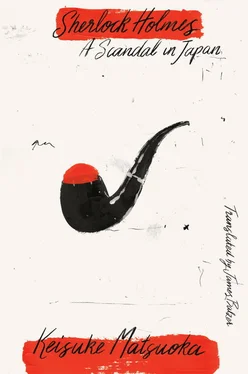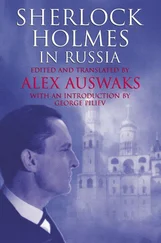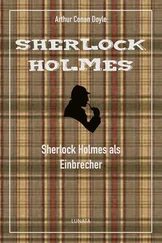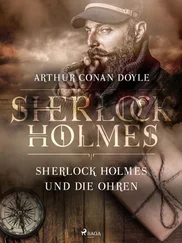Sherlock’s expression remained calm. “That explains why the case was so simple. I was being led.”
“Once the translation was complete, we replaced the book with an unaltered copy so that there would be no proof of what we had done. We took great pains to ensure that the staff at the Ministry of Agriculture and Commerce, with their shallow level of expertise, would never notice the discrepancies if they compared the original and the translation. This ensured that if a written stance about pollution were to be presented to the Diet in ten years’ time or so, the Ministry of Agriculture and Commerce would dismiss it. Or rather, our plans should have ensured it. Mr. Holmes, might I ask how you realized the truth? According to our information, you understand neither Russian nor Japanese.”
Sherlock snorted and glanced at Shevich.
“I requested another copy be sent from Russia,” the ambassador explained.
Anna glared at him contemptuously. “You imbecile. Why would you do such a thing?”
“My reasons were complicated. I wished to avoid British involvement… Regardless, doing so has allowed me to learn the truth. I cannot believe that these were the Emperor’s orders. I was told nothing.”
“Of course you were told nothing. In the future, if there was a dispute over the content of the Complete Work, it was important that you had plausible deniability. Without any evidence, you would feel no responsibility, and Russia’s name would remain clean.”
“So I was used as a shield…”
“That is what it means to be an ambassador. They are pawns sacrificed to the enemy for the sake of the country. A pawn has no need to see the board.”
Ito had still not overcome his shock—not at the sudden change in Anna’s personality, nor at the stunning feat of intellect Sherlock had performed to unravel this mystery.
Sherlock had claimed that he only wanted a copy of The Complete Work on Russian Natural Sciences to scientifically analyze the natural phenomena of Japan so that his powers of deduction would be put to better use. But it was more likely that he had already foreseen the necessity of confirming the book’s contents. His foresight displayed stunning levels of imagination and vigilance.
Sherlock spoke. “Did you think that employing Tzybin would buy you more time? Your plans are over. Now that Japan is aware of pollution, this crisis will be averted. The Japanese are diligent, and will likely find a way to halt or even reverse the spread of environmental damage even before the rest of the world does. The Okhrana’s attempts to manipulate both Russia and Japan have now been thwarted.”
Anna’s expression grew icy. “Are you sure Japan knows all about pollution now? Rather, isn’t it only Chairman Ito who is aware?”
The atmosphere in the room suddenly shifted. Anna raised a hand. The curtain by the window split open; a human shadow lurked there. A young man with blond hair, holding a pistol. He raised it in Ito’s direction.
Sherlock acted in a flash. He crouched over the chairman, grabbed him by the collar and dragged him down to the floor. A split second later the sound of a gunshot tore through the air. The room was illuminated with a flash of pale blue light. One of the guards groaned and toppled to his knees.
In the next instant, a barrage of gunshots erupted. The bullets must have struck the wall, as a fine rain of woodchips began raining down on them. Soon the room was enveloped in clouds of powder, smoke, and dust.
Sherlock had just saved his life, Ito realized. Even now he continued to shield him from the bullets. At the moment, Ito’s only concern was whether or not his friend was safe.
An angry shout broke through the gunfire. The noise ceased, and the voice grew distinct. It was Kanevsky. “Stand down! Stop shooting!”
The few remaining pops trailed off, and the room fell silent. Ito’s ears were ringing. As he attempted to sit up, Sherlock crawled to the side and leaned back against the wall with a heavy sigh.
Ito rushed over. “Are you all right?”
“Perfectly fine,” Sherlock said, waving him off with one hand. “More importantly, look at this prodigious mess.”
Ito glanced around the room and gulped.
The room had been half-destroyed with bullets. The furniture and the decorations were ruined, with pieces scattered across the room. The tattered curtains were caked red with blood, and Anna Luzhkova lay slumped over her desk. Several bullets had apparently pierced her body, and blood was seeping from wounds on her back. Her face lay on its side, eyes wide. Her pupils were dilated and unblinking. She was clearly dead.
Sherlock approached the window. Ito followed.
There was a pistol on the floor. Sherlock turned over the young man who lay prostrate next to it. His blond hair was stained red. He had been shot in the face.
“Our only witnesses have been killed,” Sherlock spat.
Kanevsky rushed to his side. “It was self-defense, it couldn’t be helped.”
“There was no need to kill the lady as well! There must be a reason that Chekhov is not here. It was utter foolishness to allow her to die before we learned what that reason was.”
Sherlock rifled through the young man’s coat as he spoke and withdrew the man’s wallet. There was an identification card inside, impressed with the Russian seal of the double-headed eagle.
Shevich drew close and peered at the card. “Jacob Akhatov, Ministry of Internal Affairs Security Department. Another member of the Okhrana.”
There was nothing else remarkable about the contents of the man’s pockets. Sherlock placed his nose near the dead man’s temple. “He smells of seawater. He has changed his suit, but before that he may have been swimming in the ocean. There is a depression in his skin where wire was wrapped around his finger. It was not made in one day—he did this every few days. The mud on his shoes is mixed with sand.”
The detective withdrew several small paper packets from his own breast pocket. Each was inscribed with a place name, in English. He opened the packet marked “Daiba.” There was soil inside. He withdrew a pinch with his fingers, and with his other hand scraped some of the dirt from Akhatov’s shoes. He rubbed his fingers together on each hand. “They are the same,” he muttered. “This man was walking along the shore at Daiba, no more than an hour ago.”
One of the other packets caught Ito’s eye. “Hold on, does that say pleasure quarters ?”
“Consider it insurance, to maintain the domestic bliss of your household.” Sherlock stood up. He approached the remnants of the gunfire-decimated desk, and opened each of the drawers. Next he moved to the bookshelf and began rifling through the books, tossing them aside as he searched.
Shevich eyed Akhatov’s corpse. “I travel to Daiba frequently and I have never seen this man. Perhaps he was disguised as a sailor.”
Sherlock continued upending the contents of the bookshelf. “He has no suntan so he could not have been passing himself off as a sailor. The compression marks on his face indicate that he was wearing a diving suit. Yes, here we are.”
He waved a large book in the air and opened the cover. The insides had been carved out into the shape of a cone. He turned to Kanevsky.
“Can you think of any weapons or equipment used by the Russian military that would fit this cavity?”
Kanevsky peered inside the book. His expression grew pinched. “A suction plate for a land mine. It has a waterproof guard so that the mines, usually buried underground, can be used at sea. The plate is attached with wire.”
Ito gasped. “You think that this Akhatov was going to sink the warships?!”
“Wait,” Sherlock said. “The timing would be too coincidental. We must assume that there have been explosives on the ships all along, and that Akhatov was only checking and replacing them.”
Читать дальше












